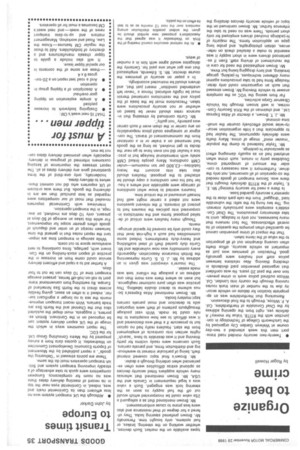Organize to beat crime
Page 37

If you've noticed an error in this article please click here to report it so we can fix it.
by Roger Howell • Twenty-two security minded road transport men this week attended a two-day course at Welwyn Garden City organized by the Letchworth College of Technology in conjunction with the RTITB. Value for money? A definite yes, right from the opening address by the Chief Constable of Hertfordshire, Col. A. F. Wilcox, through to the final discussion. Remarking that Hertfordshire was an appropriate location for debate on vehicle security due to the number of main trunk routes running through the county into London, Col. Wilcox outlined police work in crime prevention over the past 20 years. He was confident that organized prevention paid dividends in checking thieving. Also relations between police staff and hauliers were generally good. Protection of premises was just as important as vehicle security, office thefts often causing disruption out of all proportion to the value of the items taken. That the impact of crime prevention cannot be quantified often prompts the question of its overall effectiveness. The fact remains that many businesses, not only in haulage, omit to take elementary precautions. The Chief Constable's examples were particularly interesting. The key hung by the safe: the vulnerable load "dragged" from the cafe park close to the operator's securely guarded base. Is there a need for security training? Mr. E. E. Taylor of the RTITB definitely thought that there was. Secure transport of goods needed the co-operation of all concerned, not only the driver. Furthermore it was necessary to consider the amount of unreported crime. Doubtless petty in nature, such crime when analysed had an as equally . damaging effect as spectacular hi-jackings. Mr. Taylor hastened to damp the popular "master mind" image of crime. Many thefts were definitely opportunist. The haulier had to appreciate that a little organization security-wise would effectively counter the smalltime criminal.
Mr. J. T. Brown, a director of Atlas Express Ltd., and chairman of the RHA Security Committee, is well known through his Vehicle Observer Corps activities.
Far from seeing the VOC as the complete answer to vehicle thieving Mr. Brown stressed that such an organization could only deter. Haulage firms had to take precautions against many different techniques, hi-jacking, garage breaking, and lorry dragging being but three. Mr. Brown emphasized the need for care in the recruitment of driving staff. Even if experienced drivers were in short supply it was essential to make a detailed check on references, obtain photographs, and probe long gaps on application forms, The majority of hi-jackings involved drivers employed for only short periods. There was no need to take the inference further. Mr. Brown continued on the topic of vehicle security devices detailing the
types available on the market. Such devices, whether working on the steering, brakes, or fuel systems, only bought time. Personally Mr. Brown preferred steering locks. They offered a fair degree of thief resistance and also were less prone to cause embarrassment.
Mr. Brown mentioned that as a safeguard a 25s valve could be incorporated which would cut off the fuel supply as soon as the steering lock was engaged. Such a valve was a legal requirement in Canada and the USA. Mr. Brown mentioned that whereas many vehicle suppliers fitted security devices as optional extras difficulties were often experienced when ordering through a dealer.
Mr. Brown's final topic covered internal theft, being of particular interest to warehousing and distribution firms, and parcels carriers. Such concerns were ready victims for petty thieving and it was desirable to have "search" rights written into contracts of employment from the start. Hauliers really had no option but to prosecute if a thief was discovered and it was difficult to see how exceptions to the rule could be made. With vast package throughputs patterns of theft were important aids to detection and most parcels carriers kept mystery books.
Mr. Brown mentioned Atlas Express's bonus scheme to detect double labelling. This was as often pure customer negligence, but even so where there was more than one address on a package the villians' task was made easier.
The insurers viewpoint was given in an address byur Mr. J. D. S. Curtis representing the British Insurance Association. Apparently commodity mmodity was now vulnerable and Mr. quoted theft of s Curtis duly quoteel scaffolding ty and heavy-du transformers. Indeed some commodities had such a high-risk level that they could only be covered by special arrangements. Though many hauliers were critical of detailed proposal forms and the restrictions incorporated into policies the insurers had to protect all interests. If the relevant questions were not asked a carrier might well find himself uninsured at the critical time. Insurers wanted to know what conditions of carriage were applicable and where a haulier had his own conditions a copy should be attached to the proposal. Hauliers should also take into account the heavy liabilities—£3,500 per ton maximum—under CMR conditions. Many people linked CMR solely with international haulage but in practice a haulier did not even have to go near the docks to get involved, so long as the goods had remained on a trailer or in a container from the commencement of transit. The consignor or consignee could place responsibility on any carrier in the chain even if such carrier was patently "not guilty".
Mr. Curtis continued by stressing that insurance rates should never be based on whether or not security precautions were taken. Precautions must be the basis of the policy and the restrictions contained therein must be rigidly enforced. Hence a "never left unattended condition" meant just that, and drivers should be instructed accordingly.
In a paper on security of premises the course director, Mr. S. Edwards, emphasized that one got what one paid for. Certainly the delegates would agree with him in a number of ways.




















































































































